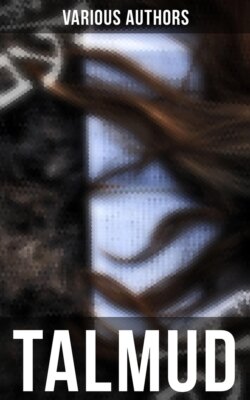Читать книгу TALMUD - Various Authors - Страница 112
На сайте Литреса книга снята с продажи.
CHAPTER IV.
ОглавлениеMISHNAS I. to IV. Regarding if the New Year fall on Sabbath. Where the shofer (cornet) should be blown after the Temple was destroyed. What was the difference between Jamnia and Jerusalem? Once it happened that New Year's Day fell on the Sabbath, and all the cities gathered together. Said R. Johanan b. Zakkai to the Benai Betherah: "Let us sound (the cornet)!" "First," said they, "let us discuss!" R. Johanan b. Zakkai ordained that the palm-branch should everywhere be taken seven days, in commemoration of the Temple. Since the destruction of the Temple, R. Johanan b. Zakkai ordained that it should be prohibited (to eat of the new produce) the whole of the day of waving (the sheaf-offering). Once the witnesses were delayed in coming, and they disturbed the song of the Levites. They then ordained that evidence should only be received until (the time of) the afternoon service. Concerning what songs the Levites had to sing every day from the Psalms. What did the Levites sing when the additional sacrifices were being offered on the Sabbath? What did they sing at the Sabbath afternoon service? According to tradition, a corresponding number of times was the Sanhedrin exiled. The witnesses need only go to the meeting place (of the Beth Din). Priests may not ascend the platform in sandals, to bless the people; and this is one of the nine ordinances instituted by R. Johanan b. Zakkai, 53-57
MISHNA V. Regarding the order of the benedictions on New Year's Day at the morning prayer, additional prayers, and at what time the cornet must be blown, etc. What passages from the Scriptures are selected for additional prayers on New Year's Day. To what do the ten scriptural passages used for the Malkhioth correspond? How many passages must be recited from Pentateuch, Prophets, and Hagiographa? We must not mention the remembrance of the individual (in the Zikhronoth), even if the passage speaks of pleasant things. What are the passages which must be said in the benediction of Malkhioth, Zikhronoth, and the Shophroth? R. Elazar b. R. Jose says: "The Vathiqin used to conclude with a passage from the Pentateuch." "Hear, O Israel, the Lord our God is our Lord," may be used in the Malkhioth. The second of those who act as ministers of the congregation on the Feast of New Year shall cause another to sound the cornet on days when the Hallel (Service of Praise, Ps. cxiii.-cxviii.) is read. We are permitted to occupy ourselves with teaching (children) until they learn (to sound the cornet), even on the Sabbath. The order, and how many times it must be blown; also, the different sounds and the names of them. How all this is deduced from the Bible, and the difference of opinions between the sages. Generally the soundings of the cornet do not interfere with each other, nor do the benedictions, but on New Year's Day and the Day of Atonement they do. R. Papa b. Samuel rose to recite his prayers. Said he to his attendant, "When I nod to you, sound (the cornet) for me." Rabha said to him, that this may only be done in the congregation. A man should always first prepare himself for prayer, and then pray. R. Jehudah prayed only once in thirty days, 57-66
Footnotes
1 See introduction to synopsis of Tract Sabbath, Vol. I., p. xxix.
